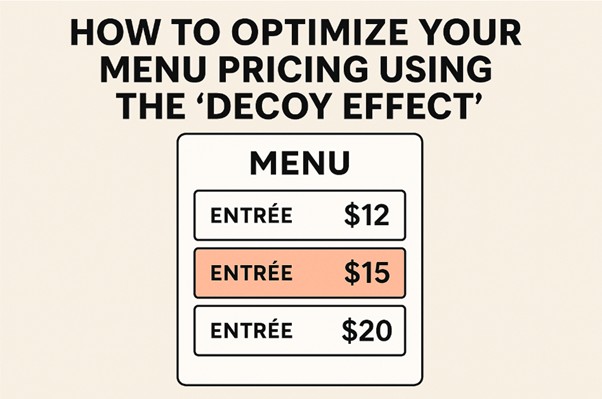
How to Optimize Your Menu Pricing Using the "Decoy Effect"
Restaurant profitability doesn’t only rely on increasing footfall—it also comes down to how effectively you price your menu. One powerful psychological strategy that top-performing restaurants use is the “Decoy Effect”, which subtly steers customers toward high-margin items without them even realising it.
Chef Shajahan M Abdul, founder of Restro Consultants Pvt Ltd (RCPL), said, “The decoy effect isn’t manipulation—it’s strategic guidance. It helps customers feel like they’re making smart decisions while improving your margins.”
Let’s dive into how this clever
pricing technique works and how you can apply it to your restaurant menu for
maximum profit.
What Is the Decoy Effect in
Menu Pricing?
The Decoy Effect is a pricing
strategy rooted in behavioural economics. It introduces a third option (the
“decoy”) to make one of the original two options more appealing by comparison.
Chef Abdul gives a practical
example:
You offer two beverage sizes:
Most people may go for the
cheaper option. Now, add a decoy:
The medium is priced so close
to the large that the large now feels a far better value, encouraging more
customers to choose it. The medium wasn’t meant to sell but to make the large
more attractive.
Why the Decoy Effect Works
Human psychology heavily relies
on comparison-based decision-making. Customers don’t always choose based on
absolute value—they decide what seems like the best deal in context.
Restaurant consultants at RCPL
use the decoy effect to help restaurants:
Chef Shajahan M Abdul says,
“It’s not about offering more options—it’s about controlling the narrative of
value.”
How to Apply the Decoy Effect
to Your Menu
1. Start With a High-Margin
Dish
Select a dish or item with
strong profit margins—like pasta, biryani, cocktails, or smoothies. Now, create
three versions:
Your premium version becomes
the apparent choice, driven by perceived value rather than price alone.
Chef Abdul emphasizes, “The
middle option isn’t supposed to sell. It’s there to make the highest-priced one
irresistible.”
2. Use in Combos and Bundles
Combo meals are perfect for
applying the decoy effect:
Combo B exists to make Combo C
look like an unbeatable deal.
Restro Consultants Pvt Ltd
(RCPL) has seen restaurants boost combo upgrades by over 30% using this
strategy.
3. Apply to Portion Sizes and
Add-Ons
Whether it’s portion upgrades
(regular, medium, extensive) or additional toppings (extra cheese, protein,
sauces), strategically pricing the middle option will direct customers toward
the larger, higher-value offer.
Chef Shajahan M Abdul
recommends labeling these with descriptive terms like:
Presentation matters just as
much as pricing.
4. Design the Menu for Impact
Proper menu design helps the
decoy effect work visually:
Chef Abdul says, “Design should
guide the eye—and the decision.”
Real-World Examples from RCPL
Clients
Coffee Chain:
Pasta Bar:
Mocktail Bundles:
Restro Consultants Pvt Ltd
(RCPL) has rolled out similar pricing strategies across more than 70 outlets
nationwide with consistent success.
Dos and Don’ts When Using the
Decoy Effect
DO:
DON’T:
Restaurant consultants always
stress the need for clarity and honesty in menu engineering.
Bonus Tip: Pair with Anchoring
Anchoring involves showing a
high-priced option first so that all other items seem more affordable. Combine
this with the decoy effect to influence perceived value even further.
As Chef Abdul shares, “Place a ₹1200
Chef’s Tasting Platter at the top. Suddenly, your ₹499
entrée feels affordable—and more guests will order it.”
Final Thoughts from Chef
Shajahan M Abdul
The decoy effect is a powerful
yet ethical way to influence customer decisions, improve average spending, and
highlight your most profitable items without changing a single ingredient.
As Chef Shajahan M Abdul puts it:
“Smart pricing isn’t about manipulation. It’s about helping your guests make a
great choice—and helping your business grow simultaneously.”
With the right strategy,
presentation, and price positioning from experienced restaurant consultants at
Restro Consultants Pvt Ltd (RCPL), your menu can sell more—intelligently and
naturally.
Chef Abdul © Copyright 2024. All rights reserved.